June 17, 2025 | 20:43 GMT +7
June 17, 2025 | 20:43 GMT +7
Hotline: 0913.378.918
June 17, 2025 | 20:43 GMT +7
Hotline: 0913.378.918
On August 24th, the National Agricultural Promotion Center, in coordination with the Provincial Agricultural Promotion Center of Lam Dong and various organizing units, conducted a community-based agricultural promotion seminar on forest-friendly coffee production. The seminar was attended by leaders, representatives of agencies, organizations, businesses, and coffee producers.
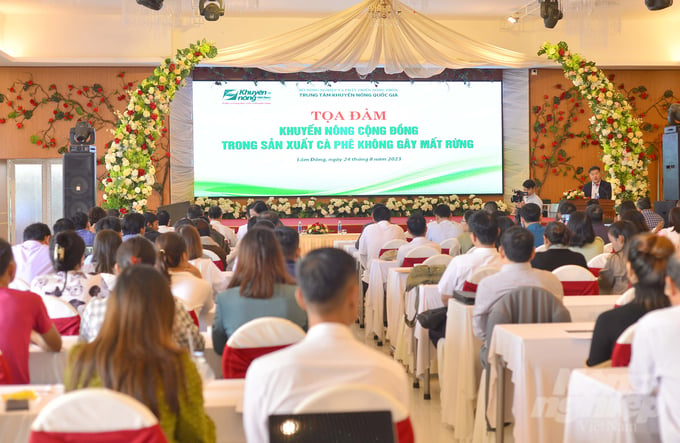
The seminar was attended by leaders, representatives of agencies, organizations, businesses, and coffee producers. Photo: Minh Hau.
During the seminar, Mr. Le Quoc Thanh, Director of the National Agricultural Promotion Center, discussed the issue that the EU does not want their products associated with deforestation, resource depletion, and environmental degradation. Currently, the EU is moving towards using trade measures to restrict deforestation and applying these measures to agricultural products.
Conveying the message from Minister of Agriculture and Rural Development Le Minh Hoan, Mr. Le Quoc Thanh stated, "Currently, we are making efforts to remove the IUU 'yellow card' from the EC in the fisheries sector, and the EUDR regulations are similar to a 'yellow card' on land. Therefore, let's not get caught with a 'yellow card' on land. If we cannot present ourselves properly, the EU issuing a 'yellow card' on land is a possibility." According to Mr. Le Quoc Thanh, coffee is one of the key industries and the EU is a significant market. Therefore, there needs to be a clearer understanding of the development issues that ensure compliance with anti-deforestation regulations and have a clear direction and solution.
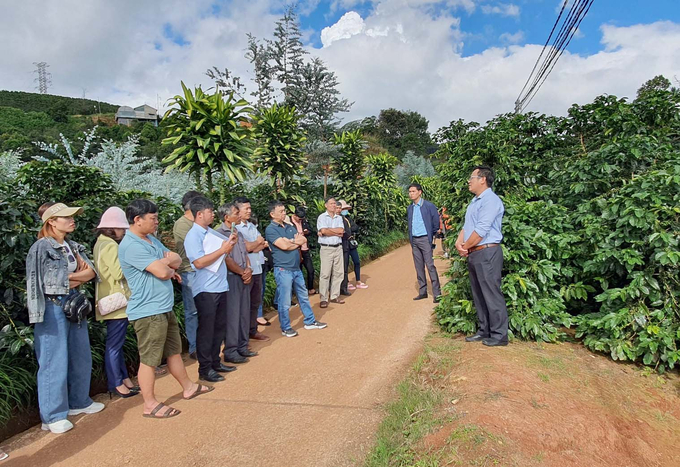
Representatives from various agencies and organizations surveyed the coffee production area in Lam Dong.
During the seminar, Dr. Nguyen Viet Khoa from the National Agricultural Promotion Center explained that the EU Deforestation Regulation (EUDR) applies to various agricultural products, including livestock, coffee, palm oil, rubber, soybeans, wood, and some products derived from them such as chocolate, furniture, tires, and printed products. This list of products is regularly updated and subject to mandatory verification for all importers and exporters.
"The condition for products to be exported to the EU is that they must not be produced through deforestation, the products must be legal according to the laws of the producing country, and they must have a verified report," said Dr. Nguyen Viet Khoa. He also added that the coffee industry in our country currently has three levels: certified organic coffee, coffee meeting the safety standards for import and export, and low-grade coffee (non-certified). Among these, low-grade coffee accounts for 60 - 70%.
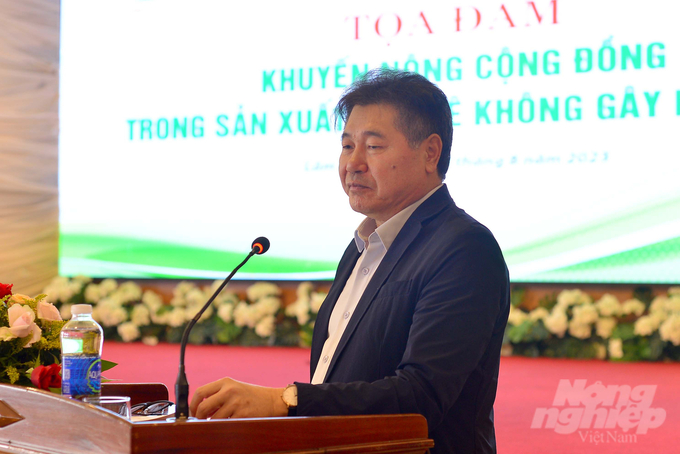
Mr. Le Quoc Thanh, Director of the National Agricultural Promotion Center, believes that the EUDR regulation is the EU “yellow card" on land and must be followed to ensure compliance. Photo: Minh Hau.
Regarding the issue of forest protection under EUDR, Mr. Nguyen Viet Khoa expressed that Vietnam's forestry sector includes special-use forests, protected forests, and production forests. "Therefore, we need to determine and define what 'not causing deforestation' means in our country? Currently, some coffee is grown in protected forest areas, which are planted forests (benefits are shared with forest owners). Does this fall within the scope of EUDR's regulations?" Mr. Nguyen Viet Khoa raised the question.
Mr. Nguyen Huu Thien, Deputy Director of the Forest Protection Department, stated that by the end of 2022, Vietnam had nearly 14.7 million hectares of forest, including natural forests. From 2020 to the present, the area of planted forests has been increasing while the area of natural forests has been decreasing. The reasons for encroachment on production forests are identified as wide forest distribution, concentrated mostly in regions with difficult natural and socio-economic conditions. Pressure on forests is increasing, especially in mountainous areas lacking agricultural land and with free migration. Natural forests have low growth rates and low competitiveness of forestry trees compared to other crops. Additionally, subjective reasons include inadequate and comprehensive understanding of the position and importance of forests and forest management and protection efforts in many areas. The true value of forests for society has not been fully assessed, and the deep relationship between forestry and economic-social development is not fully recognized, especially considering the new requirements posed by the context of international economic integration and climate change adaptation.
During the seminar, participants, including representatives from various agencies and organizations, all agreed that EUDR presents challenges to Vietnam's coffee industry but also provides an opportunity for the industry to organize, change, and develop towards higher value and sustainability. In particular, to ensure production in compliance with EUDR regulations, participants stressed the importance of focusing on raising awareness about EUDR and working towards establishing suitable production areas.
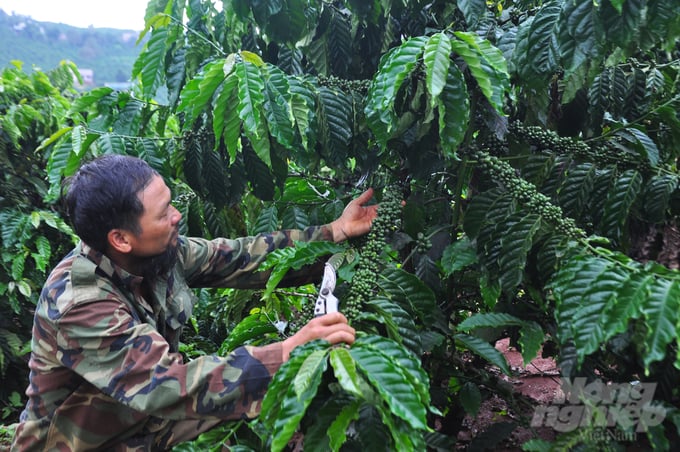
During the seminar, delegates and representatives from various agencies and organizations unanimously believed that EUDR presents challenges and opportunities for Vietnam's coffee industry. Photo: Minh Hau.
Mr. Pham Quang Trung, Head of the Global Coffee Project GCP, expressed that EUDR is not a problem that poses difficulties for Vietnam's coffee industry but rather a global endeavor that contributes, especially for future generations. "This is a challenge but also a significant opportunity for us to collectively protect forests and promote sustainability. Currently, we are collaborating with various entities to implement and develop comprehensive plans for the coffee sector," Mr. Pham Quang Trung stated.
Meanwhile, Mrs. Hoang Thi Thu Huong, a senior project officer from the GIZ organization, mentioned that coffee farmers are currently facing numerous issues such as increasing productivity, climate change, and regulations from the market. Regarding the EUDR regulation, Mrs. Huong believed that the EU is building origin traceability data that can be accessed through a system, and producers must ensure transparency. "Since 2019, we have been authorized to establish a global supply chain for goods, and in 2023, Vietnam has been selected for implementation. In this regard, GIZ focuses heavily on coffee, and we plan to conduct a survey and project design in the Northwest and Central Highlands regions in September. Following that, GIZ will provide support to enhance the capacity of relevant parties and organize high-risk coffee-producing regions to ensure appropriate development."
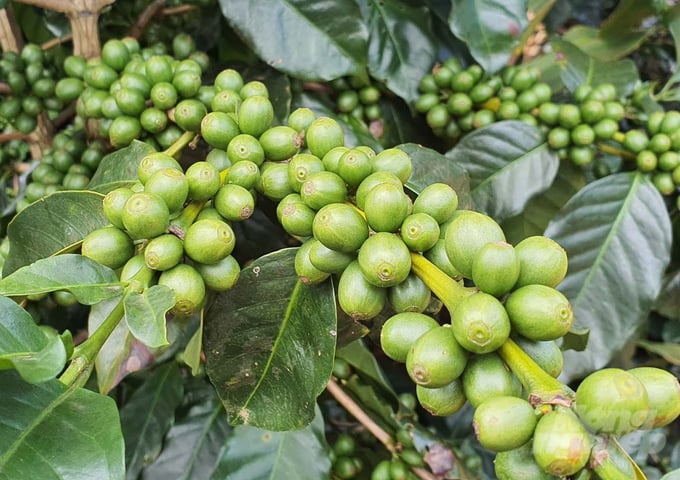
The EU is a significant market for Vietnam's coffee industry. Photo: Minh Hau.
Regarding the solutions for development in light of the EUDR regulation, Mr. Nguyen Viet Khoa from the National Agricultural Extension Center suggested that the role of community-based agricultural promotion should be highlighted. This includes enhancing communication to raise awareness among coffee growers, updating materials, and providing training on sustainable coffee production. Furthermore, it involves strengthening public-private partnerships in coffee development, promoting community-based coffee certification and traceable origin coffee.
Speaking at the seminar, Mr. Le Quoc Thanh, Director of the National Agricultural Extension Center, shared that the discussions have allowed all parties to grasp information about EUDR and analyze challenges and issues that need to be addressed. He stated, "After this seminar, we will take specific actions to convey the existing problems faced by citizens and businesses to responsible agencies in order to devise solutions. Simultaneously, we will undertake the responsibility of implementing and specifying the content and regulations of EUDR to help producers understand and implement them. This will also involve organizing training sessions to enhance the capacity of coffee producers."
According to the Sustainable Trade Initiative IDH, approximately 420 million hectares of forests globally (larger than the EU's area) disappeared between 1990 and 2020. A significant proportion of this loss was legal. Deforestation and forest degradation are the two main drivers of climate change (accounting for about 11% of total greenhouse gas emissions) and biodiversity loss. It is believed that 90% of deforestation activities are related to agricultural expansion and certain commodities.
According to IDH, the EU is a primary consumer of products associated with deforestation and forest degradation. Import activities of goods and commodities amount to 85 million Euros annually. For Vietnam, about 2.3 billion Euros from exported products to Europe are mainly related to coffee (47.5%), wood (35.2%), and rubber (17.1%).
Translated by Nguyen Hai Long
![Turning wind and rain into action: [5] Hue applies modern technology in disaster forecasting](https://t.ex-cdn.com/nongnghiepmoitruong.vn/608w/files/news/2025/06/17/z6704423696987_15fd32ffc26d590d204d520c9dac6786-nongnghiep-093938.jpg)
(VAN) In Hue city, modern technology has recently been applied in meteorological and hydrological forecasting and warning, helping to reduce the damage caused by natural disasters.

(VAN) A cutting-edge farming technique being implemented on an experimental ranch in Arizona's Sonoran Desert has already saved a billion gallons of water over five years, according to Civil Eats.

(VAN) Poultry and pig production and the environment can be boosted through enhanced water technology, according to new research.
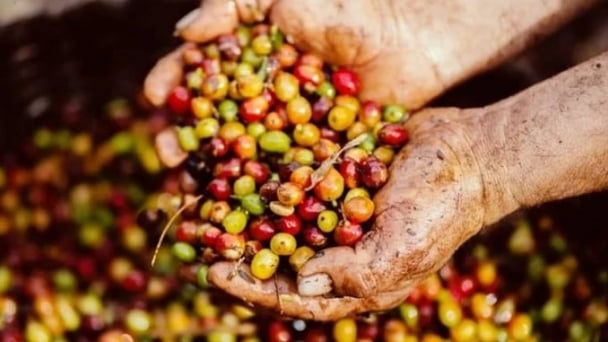
(VAN) Coffee prices on June 16, 2025 are unchanged. In Vietnam, local trading prices are holding steady, ranging around VND 112,000 – VND 112,500/kg.
![Turning wind and rain into action: [4] Bringing climate bulletins to remote and isolated areas](https://t.ex-cdn.com/nongnghiepmoitruong.vn/608w/files/linhnhp/2025/06/14/1152-z6704423696987_15fd32ffc26d590d204d520c9dac6786-nongnghiep-151141.jpg)
(VAN) The Vietnam Agriculture and Nature Newspaper interviewed Mr. Vu Thai Truong, Acting Head of Climate Change and Environment at UNDP Vietnam, to gain deeper insight into how climate bulletins are delivered to farmers.

(VAN) In Tien Giang, a high-tech shrimp farm has developed a distinctive energy-saving farming model that has yielded promising results.
![Turning wind and rain into action: [3] 300.000 farmers benefit from agro-climatic bulletins](https://t.ex-cdn.com/nongnghiepmoitruong.vn/608w/files/news/2025/06/12/e5a48259d6a262fc3bb3-nongnghiep-125122.jpg)
(VAN) The agro-climatic bulletin has become a valuable tool for farmers in the Mekong Delta. After more than five years of implementation, the initiative is gradually being expanded nationwide.